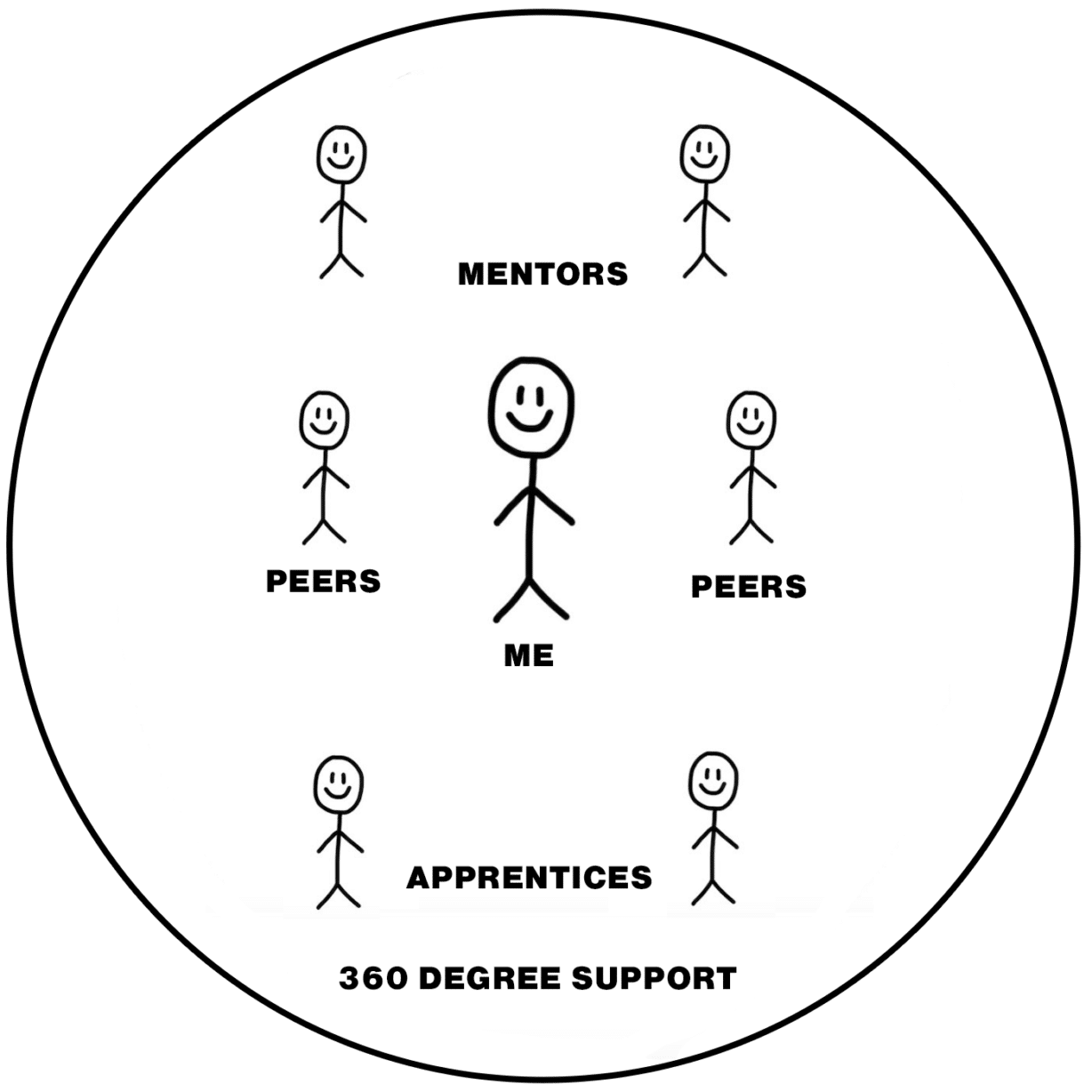It Takes a Village

Jesus came so you could live Fully Alive.
Since the secret to living Fully Alive is to actually die to your own desires and inclinations, which seems “upside-down” and contrary to what most of us want out of life, then we must admit from the outset that WE. NEED. HELP!
We cannot live the Fully Alive life on our own. It is a community endeavor. It is a team sport.
“It Takes a Village.”
This African proverb is generally used in reference to raising children–indicating that one family is not enough to provide all of the necessary resources for developing them. Following Jesus takes a village as well, and the Bible provides a powerful picture of how effective this community can be.

In the New Testament, relationship networks model what we call 360 Degree Support. To have this support around you in every direction, you need the following:
- Mentors in front of you
- Peers beside you
- Apprentices behind you
Mentors are seasoned in their walk with Jesus, filled with wisdom on how to live Fully Alive, and able and willing to share their wisdom with others. Paul was a mentor to many young leaders, most notably Timothy and Titus. Paul selected these young men to develop, and the mentoring letters he wrote to them have been preserved in the biblical books with their names on them. If Paul had not been intentional about identifying and developing these leaders, the gospel’s growth beyond the boundaries of Israel may have been severely thwarted when Paul was unjustly imprisoned.
Peers are people at a similar phase of spiritual development. They have similar hopes and ambitions as well as similar challenges and limitations. Paul had peers and was a peer to others. While Paul certainly stands out from most of his peers with his writings and accomplishments, he would have never seen those successes without the support, encouragement, and validation from peers like Barnabas, Peter, and James. Paul’s passion and personality style led to conflict with these peers, but even the conflict didn’t diminish the respect and value each gave to the other.
Apprentices are people that are measurably less developed than you are, but who eagerly desire to grow. They demonstrate initiative and are willing to sacrifice to get the time, wisdom, and challenge from a good mentor. It may seem on the surface that mentors only “give” to the apprentices they serve, but in reality, the benefits to having good apprentices outweigh the investments.
If you spend the time to develop trusting and mutually-beneficial relationships with mentors, peers, and apprentices, you will have developed your 360 Degree Spiritual Support. With this system you will have wisdom beyond your years to guide you, loyal friends by your side to protect and support you, and impressionable lives in your wake that you want to never disappoint… which is the most valuable key to accountability available.
The life-long benefits of this support are immeasurable. Like the popular proverb says, “If you want to go fast, go alone. If you want to go far… go together.” Now you know who you need. Start asking God to send you the mentors, peers, and apprentices you need to join you on the journey.
“Finding and Keeping the Right Mentors” Mentors are seasoned in their walk with Jesus, filled with wisdom on how to live Fully Alive, and able and willing to share that wisdom with others. Finding a great mentor is challenging, as many mentor and apprentice relationships are initiated by the mentor… not the apprentice. This is certainly true in the biblical examples. Paul chose Timothy. Jethro offered unsolicited advice to Moses. Elijah chose an unsuspecting Elisha to be his successor as prophet. Even Jesus, the ultimate mentor, selected His disciples to their great surprise.

What, then, can a hopeful apprentice do to find a good mentor? Here are five key steps that will increase your success:
- Become Investable
- Specify Your Growth Goals
- Look for a Mentor with Proven Growth
- Invest Before You Ask
- Prioritize Your Mentor’s Time
Become Investable – Become someone that a great mentor would notice. Becoming investable is a natural outcome of consistently developing character and calling.
In addition, you can:
- Demonstrate initiative by serving others when it is not expected. Effective mentors find it more desirous to “fuel the moving” than “motivate the stationary.”
- Demonstrate consistency by being on time, fulfilling your commitments in a timely manner, and developing emotional and inter-personal intelligence. Consistency breeds confidence.
- Demonstrate a hunger to learn by asking relevant questions. Resist the urge to do most of the talking around someone who has a lot more to say than you do.
Specify Your Growth Goals – Clarity is kindness. Do you need to grow in your leadership or disciple-making capacity? Do you want to grow in more personal areas like parenting, health, financial, or emotional wellness? Do you want to grow in a way related to your career?
Providing clarity on your growth goals will help you select the right mentor to approach. You may find that you will need multiple mentors in different areas over time. Clarity of goals can also make you more attractive to effective mentors as it is another way to demonstrate initiative and provide a clear path to being successful in the relationship.
Look for a Mentor with Proven Growth – If you are looking for a mentor to help you better manage your money, find someone who has proven to manage their own money well. Look for proven growth in your needed growth area and resist the desire to choose someone based on their popularity.
Invest Before You Ask – Finding a mentor should be similar to developing a friendship… casual, organic and one that evolves with time and mutual investment. Resist the urge to “cold call” someone to ask them to be your mentor.
I remember calling a popular pastor in the small denomination I was part of early in my career and asking him to mentor me. He knew who I was, but we had no prior relationship. After an awkward conversation that ended with him turning down my request, I hung up feeling like I had asked a girl to date steadily before we ever went on a first date. It was embarrassing.
Prioritize Your Mentor’s Time – Every effective mentor wants their time investment to make a difference. You will lose effective mentors quickly if you do not prioritize their time. Failing to show up to a scheduled meeting, being late to a meeting, or being distracted during your meeting will send the message to your mentor that their time is not valuable.
You can keep effective mentors by showing up to your meetings early with a notebook and a pen or other note-taking device. Taking notes during the conversation not only allows you to recall the important portions of the conversation, but signals to the mentor that you perceive their insight and advice as valuable and something you will implement.
The best way to demonstrate to a mentor that their investment is making a difference is to share the progress you have made since your last meeting because of their counsel. Be specific about what they said, how you applied it, and the difference it has made for you personally. After sharing the progress, thank them regularly for their investment.
Choose Your Next Step – Now you know how to prepare yourself to find a mentor. Determine where you are in the process and prayerfully decide your next step. Start with developing a relationship with one mentor and experience what a successful mentoring relationship feels like before trying for additional mentors. If you sense that first relationship isn’t going well, resist the urge to simply abandon it. Be courageous and ask them to give you feedback on the relationship so you can grow in real time.
All of us need mentors. We need the wisdom of those that are ahead of us. Having successful mentoring relationships is worth a few missteps along the way in finding them. Blessings in finding yours!
If you have enjoyed reading this, please consider joining our email list!











